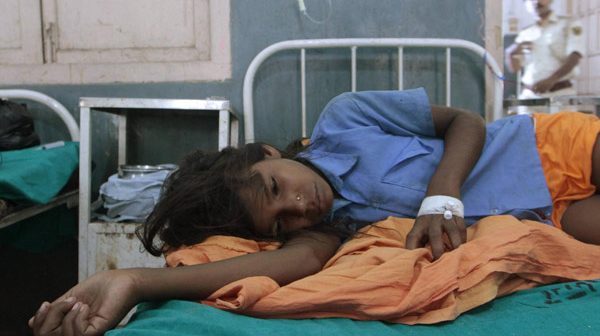Alarming Rise in Food Poisoning Cases Among Students Sparks Concerns Over Safety in Indian Schools” Introduction: In a disturbing incident, 58 children in Madhya Pradesh’s Rewa district fell ill due to suspected food poisoning after participating in a Republic Day function at a government school. While most of them are in stable condition, one girl has been admitted to a government hospital for treatment. This unfortunate event sheds light on a recurring issue that has plagued Indian schools, including the infamous Mid-Day Meal program, in recent years – food poisoning among students. Rising Trend of Food Poisoning Cases: Food poisoning cases among students have become increasingly common in India, raising concerns about the safety and hygiene standards in school meal programs.
Several instances in recent years have highlighted the severity of the problem:
2019: Bihar Mid-Day Meal Tragedy: In 2019, over 100 students fell sick in Bihar’s Saran district after consuming contaminated food served as part of the Mid-Day Meal program. Tragically, three children lost their lives. The incident sparked nationwide outrage and calls for stricter food safety measures.
2018: Tamil Nadu School Outbreak: In Tamil Nadu, more than 100 students experienced food poisoning symptoms after consuming a meal at a government school. The incident raised questions about the quality of food and its handling in school kitchens.
2017: Hyderabad Mass Poisoning: In Hyderabad, 40 students were hospitalized after consuming a contaminated breakfast at a government school. The incident brought attention to the need for regular inspections of school kitchens and stringent safety standards.
Common Causes of Food Poisoning: Several factors contribute to food poisoning cases among students in India: Poor Hygiene: Inadequate hygiene practices in school kitchens, including improper handwashing and food handling, can lead to contamination and the spread of foodborne illnesses. Low-Quality Ingredients: The use of substandard or expired ingredients in school meals can pose a significant health risk to students. Lack of Supervision: Inadequate supervision and quality control measures in school meal programs can result in lapses that compromise food safety.
Challenges in the Mid-Day Meal Program: The Mid-Day Meal program, aimed at providing nutritious meals to schoolchildren, has faced its fair share of challenges: Quality Control Issues: The program, which serves millions of students across India, often faces difficulties in maintaining consistent food quality and safety standards. Supply Chain Challenges: Ensuring the timely delivery of fresh ingredients and proper storage facilities has been a persistent challenge in many regions.
Hygiene Concerns: The preparation and distribution of meals in overcrowded kitchens with limited sanitation facilities have raised concerns about hygiene. Government Initiatives and Ongoing Concerns: While the Indian government has introduced various initiatives to address food safety concerns in schools and the Mid-Day Meal program, the challenges of enforcing these standards consistently across a vast and diverse nation persist. Adequate funding, regular inspections, and training of kitchen staff are essential components of a safer school meal system.
The recent food poisoning incident in Madhya Pradesh, combined with previous tragedies linked to the Mid-Day Meal program, underscores the urgent need for comprehensive food safety measures in Indian schools. The health and safety of India’s schoolchildren must remain a top priority, and concerted efforts are needed to improve hygiene standards, ingredient quality, and overall supervision to prevent such unfortunate incidents in the future. It is imperative that strict measures and regular inspections are enforced to ensure the well-being of students across the country.





